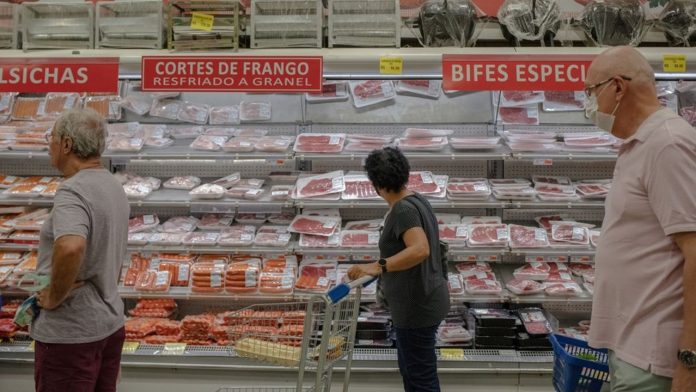Posted Sep 29, 2022, 3:53 PM
From the center west to the south, the agricultural belt of Brazil spreads out and always gains a little more ground. Leading soybean exporter, corn champion… the leading South American power is an agricultural giant. The heterogeneous sector remains largely dominated by agribusiness, a powerful lobby.
“In Brazil, agribusiness has the ability to fertilize politics,” summarizes an expert from the King’s Brazil Institute, an entity of King’s College. Its profits have skyrocketed under the tenure of Jair Bolsonaro. Soybean production (for animal feed) is benefiting from demand from China (which accounted for 56% of exports in 2021) and should reach more than 150 million tonnes this year (including 95 million for export) on 43 million hectares exploited. An increase in area equivalent to double that of our forests in France.
The essential Russian fertilizer
Brazil is also a key player in corn production, with exports in the first eight months of the year reaching 7.5 million tonnes, according to the National Association of Cereal Exporters (Anec), a figure close to historic record of 2019.
But Brazilian agriculture also has major weaknesses. On February 16, in the midst of the Ukrainian crisis and six days before the Russian offensive, Jair Bolsonaro visited Vladimir Putin in Moscow. Beyond the symbolism of the ultra-conservative president’s support for the Russian autocrat, Bolsonaro had come to seek pledges. He had obtained a commitment from Russia to guarantee an “uninterrupted” supply of fertilizers, vital for agribusiness. Brazil imports 80% of the fertilizers it uses and Russia comes first among its suppliers (20% of imports).
Productivism and food emergency
The war in Ukraine caused the price of wheat to soar and led to food inflation which was galloping in Brazil (+13% in July). However, Brazil is unable to meet its internal demand. It is the eighth largest wheat importer, buying most of it from Argentina. Brazilian agriculture does not feed its man.
The catastrophic management of the health crisis has increased inequalities and brought back hunger, which affects 33 million Brazilians (15% of the population). Upon his inauguration on January 1, 2019, Bolsonaro abolished the National Council for Food and Nutritional Security. Today, public reserves of staples such as beans and rice are insufficient. Bolsonaro gave aid to the poor but failed to address the food emergency.
The Cerrado, a third of the country’s area
The deforestation of the Amazon, which has never been so devastating as under the mandate of Jair Bolsonaro, also continues due to illegal mining and logging, and cattle ranching (Brazil is the first meat exporter). Deforestation in the Cerrado, which covers almost a third of the country, is the result of decades of intensive agriculture. In the states of Goiás, Tocantins, Mato Grosso… the war in Ukraine has reinforced farming.
“Agribusiness is not the maker of kings in an election but it has a hand in politics; more than 50% of deputies are in favor of it, explains a Brazilian diplomat. Lula promised measures to counter deforestation. If elected, he will likely do so in the Amazon under the spotlight. But at the Cerrado, I doubt it; the corporation will front. »













